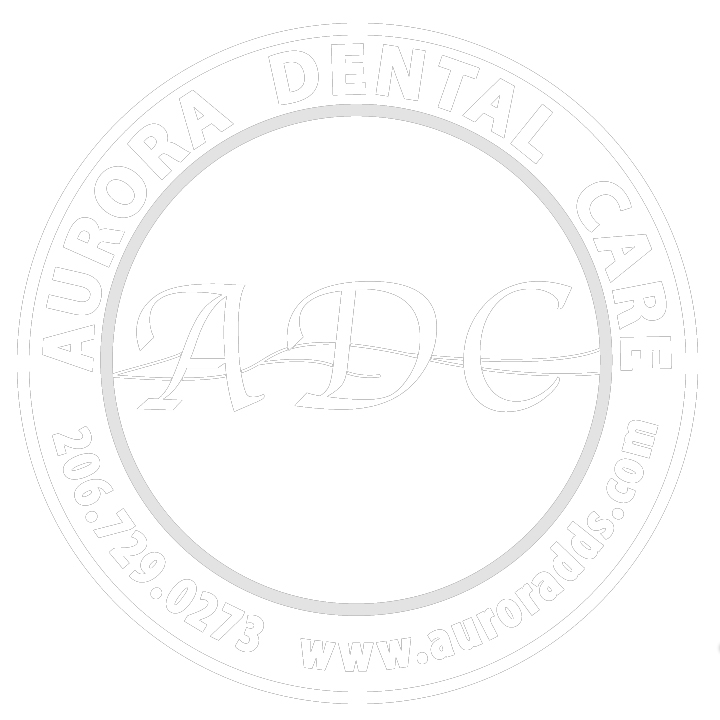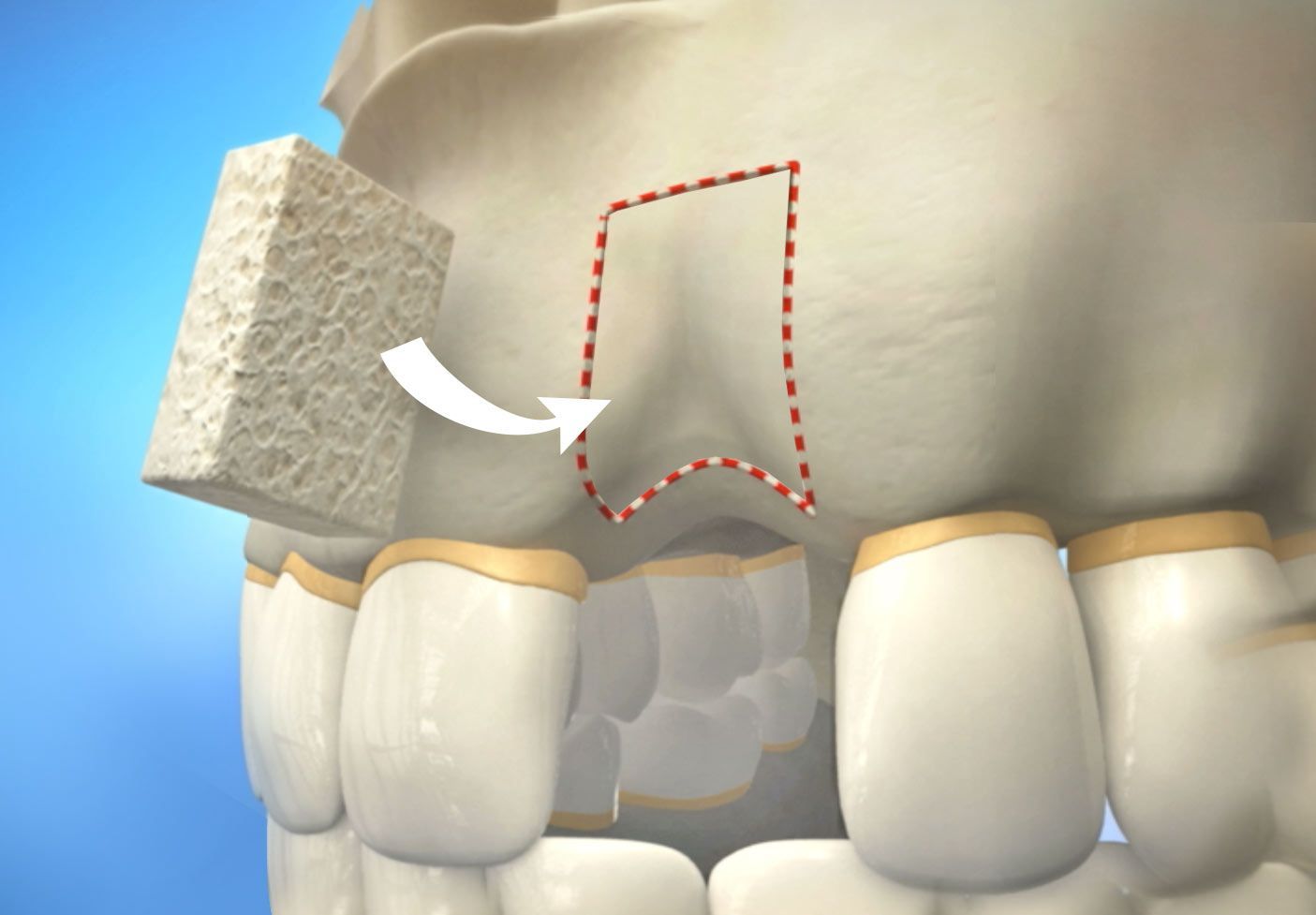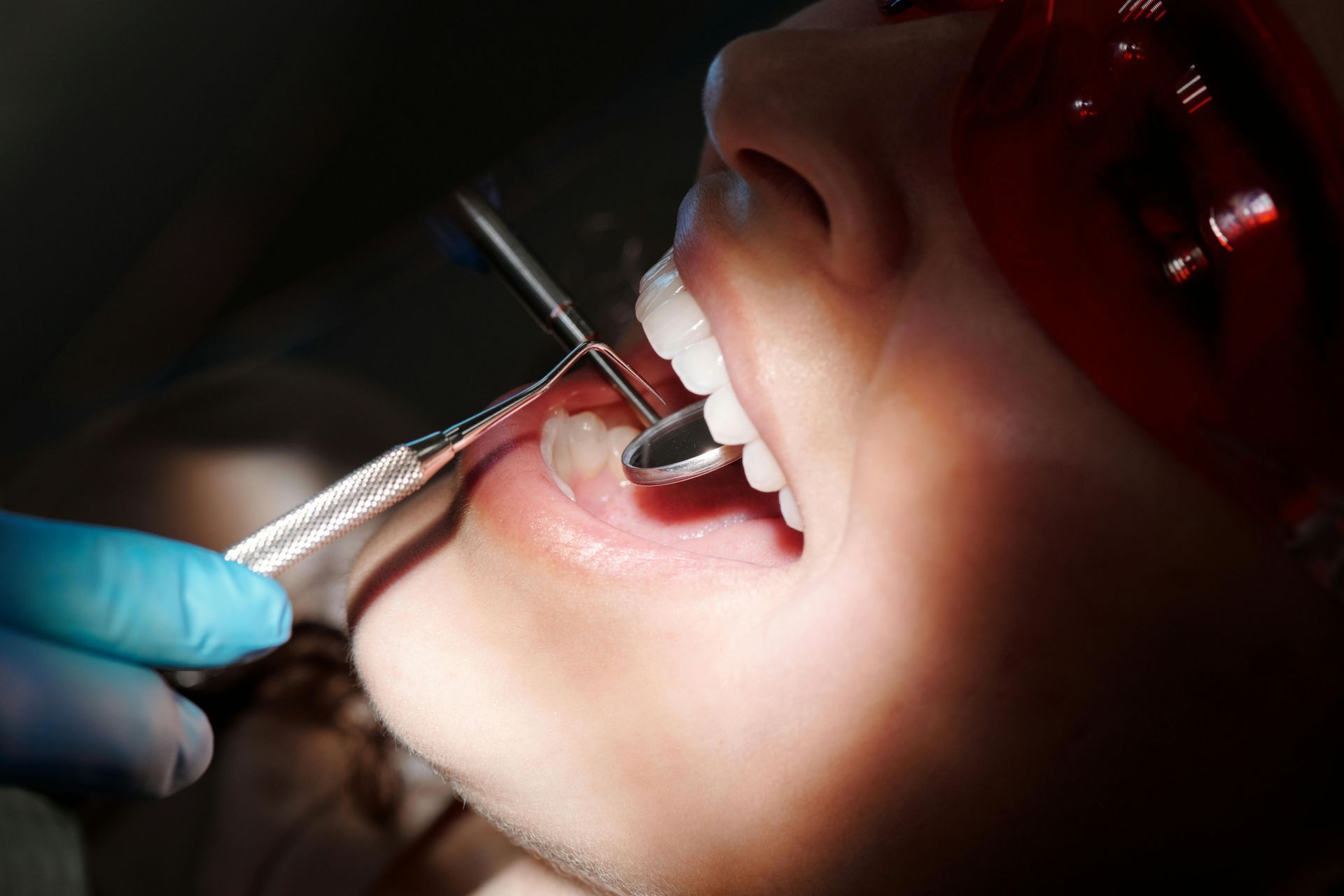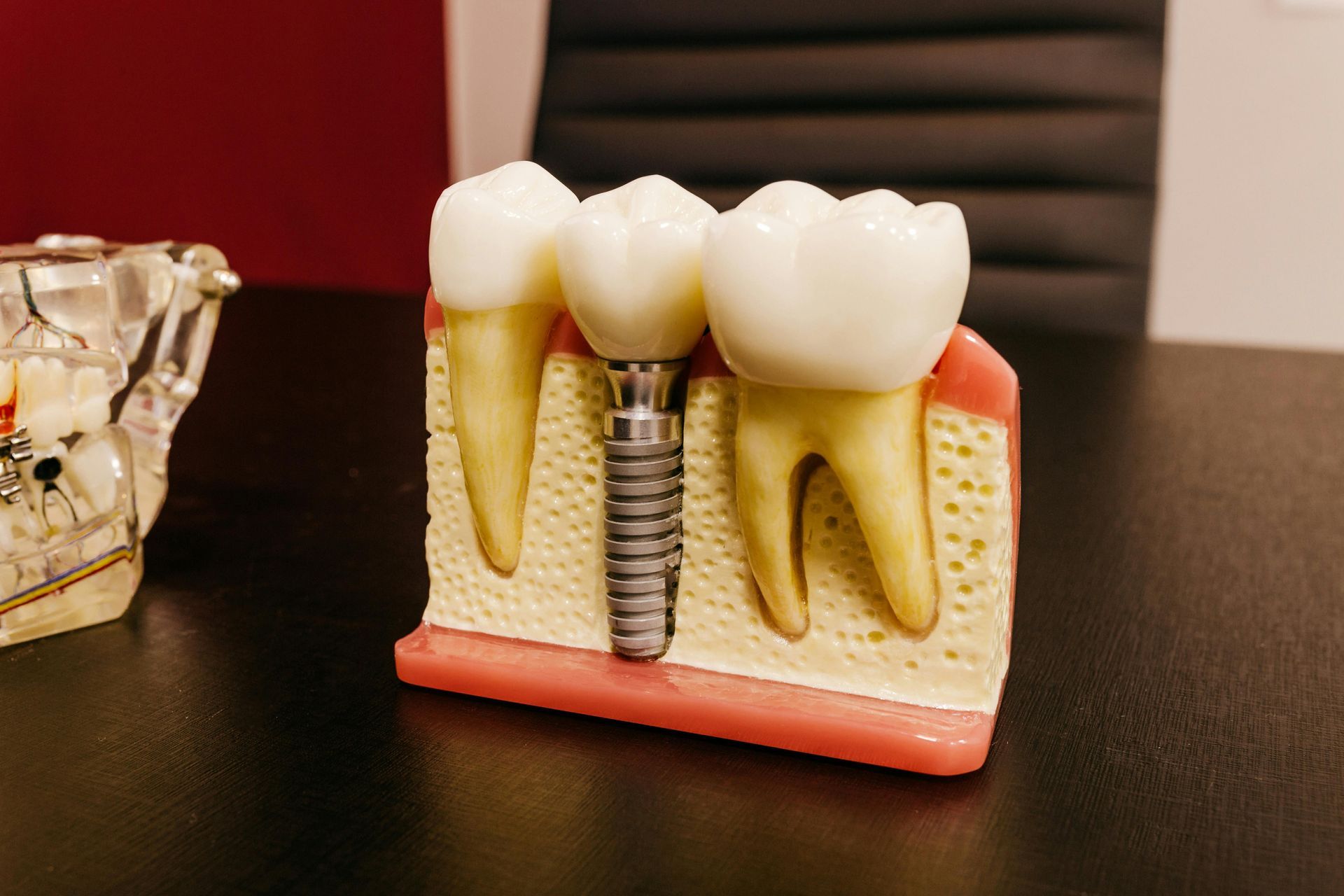Gum Disease: Diagnosis and Treatment in Seattle, WA
Protecting Your Smile with Expert Gingivitis and Periodontitis Care at Aurora Dental Care
Maintaining healthy gums is just as important as keeping your teeth strong and cavity-free. Gum disease—ranging from mild gingivitis to advanced periodontitis—is one of the leading causes of tooth loss in adults. It often develops quietly, without pain, until serious damage has already occurred. That’s why early diagnosis and treatment are essential.
At Aurora Dental Care in Seattle, WA, our team provides comprehensive evaluations, advanced therapies, and preventive care to protect your oral health. Whether you’re dealing with early-stage gingivitis or advanced periodontitis, our Seattle periodontist and dental team are here to guide you through diagnosis, treatment, and long-term maintenance.
Understanding Gum Disease
What Is Gum Disease?
Gum disease, also known as periodontal disease, is a bacterial infection that affects the tissues surrounding and supporting your teeth. It typically begins with gingivitis, a mild form of gum inflammation, and can progress to periodontitis, which involves deeper infection, gum recession, and bone loss.
Left untreated, gum disease not only impacts your smile but can also affect your overall health. Research links advanced gum disease to systemic issues such as heart disease, diabetes, and respiratory infections.
Stages of Gum Disease:
- Gingivitis
- Early stage
- Symptoms: red, swollen gums, bleeding during brushing or flossing
- Usually reversible with professional cleaning and improved oral hygiene
- Early Periodontitis
- Infection spreads below the gum line
- Small pockets form around teeth
- Gums may start to recede
- Moderate Periodontitis
- Bone supporting the teeth begins to break down
- Pockets deepen, increasing bacterial buildup
- Teeth may loosen slightly
- Advanced Periodontitis
- Severe bone loss
- Teeth may shift, loosen, or fall out
- Chronic infection can impact systemic health
Causes and Risk Factors
Gum disease is primarily caused by plaque buildup, but several factors increase your risk:
- Poor oral hygiene habits
- Smoking or tobacco use
- Genetic predisposition
- Diabetes
- Hormonal changes (such as pregnancy or menopause)
- Stress
- Medications that reduce saliva flow
- Poor nutrition
At Aurora Dental Care, we educate patients on lifestyle habits and medical conditions that influence gum health so we can tailor a personalized prevention and treatment plan.
Diagnosing Gum Disease in Seattle, WA
Early detection is key. Our Seattle dental team uses advanced diagnostic tools and thorough clinical evaluations to identify gum disease in its earliest stages.
What to Expect During a Periodontal Exam
- Medical and Dental History Review
- Discuss symptoms (bleeding, bad breath, gum sensitivity)
- Assess risk factors such as smoking or systemic health conditions
- Visual Examination
- Checking for redness, swelling, gum recession, or exposed tooth roots
- Periodontal Probing
- Measuring pocket depth between the tooth and gum
- Healthy gums measure 1–3 mm; deeper pockets suggest periodontitis
- Digital X-Rays
- Assess bone loss around teeth
- Helps track disease progression over time
- Advanced Imaging (if needed)
- 3D scans for complex cases or implant planning
This comprehensive exam allows us to provide an accurate diagnosis and recommend the best gingivitis treatment in Seattle or periodontitis treatment in Seattle.
Gingivitis Treatment in Seattle
If diagnosed in its early stages, gum disease is reversible. Our gingivitis treatment focuses on eliminating plaque and tartar while improving oral hygiene habits.
Professional Dental Cleaning
- Removes hardened plaque (tartar) from teeth and gum line
- Polishes teeth to slow future plaque buildup
Improved At-Home Care
- Brushing at least twice daily with fluoride toothpaste
- Flossing or using interdental brushes daily
- Antimicrobial mouth rinses for added protection
Lifestyle Adjustments
- Quitting smoking
- Maintaining a healthy diet
- Managing underlying conditions like diabetes
Patients who receive early gingivitis treatment in Seattle at Aurora Dental Care often see their gum health restored within weeks, provided they maintain consistent care.
Periodontitis Treatment in Seattle
When gum disease progresses, more advanced therapies are required. Our Seattle periodontist provides a range of treatments to stop the infection and preserve your natural teeth.
Scaling and Root Planing (Deep Cleaning)
- Non-surgical procedure
- Removes plaque and tartar from below the gumline
- Smooths root surfaces to help gums reattach to teeth
Periodontal Maintenance
- More frequent cleanings (every 3–4 months instead of twice yearly)
- Prevents bacteria from re-colonizing pockets
- Essential for long-term control of periodontitis
Antibiotic Therapy
- Localized antibiotic gels or oral medications
- Targets bacterial infection directly in gum pockets
Laser Gum Therapy
- Minimally invasive option
- Removes diseased tissue and sterilizes pockets
- Encourages faster healing and less discomfort
Surgical Treatments (for Advanced Cases)
- Flap surgery: lifting gums to clean deep pockets and reduce their size
- Bone grafts: rebuild bone lost to periodontitis
- Soft tissue grafts: cover exposed roots, reduce sensitivity, and improve gum appearance
- Guided tissue regeneration: encourages bone and tissue regrowth
These advanced treatments allow us to provide effective
periodontitis treatment in Seattle, even for severe cases.
Working with a Seattle Periodontist
While many early gum treatments can be performed by a general dentist, advanced cases often require a periodontist— a specialist in gum disease and supporting structures of the teeth.
At Aurora Dental Care, our Seattle periodontist collaborates with our general dentistry team to ensure seamless care. By working together, we:
- Provide accurate diagnoses and staging of gum disease
- Offer advanced surgical and non-surgical treatments
- Monitor healing and progress with cutting-edge technology
- Develop preventive strategies to stop recurrence
Preventing Gum Disease
Prevention remains the best strategy. Here are key steps every Seattle patient should take:
- Routine Dental Visits – Professional cleanings every 6 months (or more frequently for at-risk patients).
- Daily Oral Hygiene – Brushing and flossing consistently.
- Healthy Lifestyle Choices – Balanced diet, exercise, stress management, and avoiding tobacco.
- Monitor Symptoms – Don’t ignore bleeding gums, bad breath, or gum sensitivity.
- Early Intervention – Contact your dentist at the first signs of trouble.
Gum Disease and Whole-Body Health
The mouth is the gateway to the body. Periodontal disease can release harmful bacteria and inflammation into the bloodstream, increasing risk for:
- Heart disease
- Stroke
- Diabetes complications
- Respiratory illness
- Pregnancy complications
By seeking gingivitis and periodontitis treatment in Seattle, you’re not only protecting your smile but also supporting your overall health.
Why Choose Aurora Dental Care in Seattle, WA?
When it comes to gum disease care, you deserve a compassionate, experienced dental team. Patients throughout Seattle choose Aurora Dental Care because we offer:
- Comprehensive periodontal evaluations with advanced imaging
- Customized treatment plans based on your unique needs
- In-house collaboration with a Seattle periodontist
- Minimally invasive options including laser therapy
- Patient education and prevention programs
- Convenient Seattle location with flexible scheduling
Our mission is to preserve your natural teeth, restore your gum health, and give you confidence in your smile.
Living in Seattle with Healthy Gums
Seattle is a city full of life—from Pike Place Market to Discovery Park, from Green Lake to the Ballard Locks. With so much to enjoy, gum disease should never hold you back from smiling, speaking, or eating with confidence.
Aurora Dental Care proudly serves the diverse neighborhoods of Seattle, WA, and we are committed to improving not just oral health but quality of life.
Frequently Asked Questions About Gum Disease
1. What are the first signs of gum disease?
Red, swollen, or bleeding gums during brushing are early warning signs. Persistent bad breath and gum sensitivity may also indicate gum disease.
2. Can gum disease be cured?
Gingivitis is reversible with professional care and good oral hygiene. Periodontitis can be managed but usually requires ongoing maintenance to control.
3. How often should I see a dentist if I have gum disease?
Patients with gum disease typically need cleanings every 3–4 months to maintain gum health.
4. Does gum disease hurt?
Often gum disease is painless until advanced stages, which is why early detection is so important.
5. What happens if periodontitis is left untreated?
Untreated periodontitis can lead to bone loss, loose teeth, and eventual tooth loss.
6. Are gum disease treatments painful?
Most treatments, including scaling and root planing, are performed with local anesthetic. Advanced techniques like laser therapy also minimize discomfort.
7. How does smoking affect gum disease?
Smoking is one of the strongest risk factors. It weakens the immune response and slows healing, making treatment less effective.
8. Do I need a periodontist for gingivitis?
Most gingivitis cases are treated by a general dentist. A periodontist is typically needed for moderate to advanced periodontitis.
Conclusion
Gum disease is a common but preventable condition. With early detection and effective treatment, you can keep your gums healthy and your smile strong. At Aurora Dental Care in Seattle, WA, we provide everything from gingivitis treatment in Seattle to advanced periodontitis treatment in Seattle, supported by the expertise of our Seattle periodontist.
If you notice signs of gum disease, don’t wait—contact our office today to schedule your periodontal evaluation. Protect your health, preserve your smile, and trust Aurora Dental Care to provide the expert care you deserve.






